Let the hatching begin! April 11 events to mark falcon babies’ arrival
A Hatch Day event hosted by BAMPFA and Cal Falcons runs from 9 a.m. to 7 p.m., and a livestreamed Cal Falcons Q&A starts at 2 p.m.
April 7, 2023
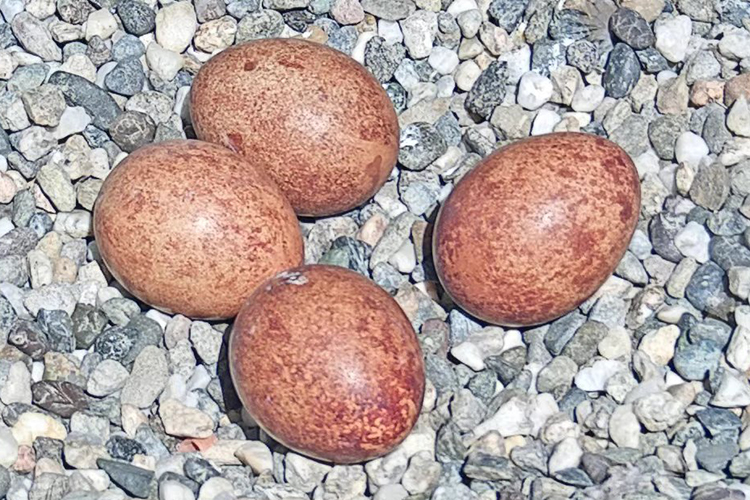
Annie and Lou have four eggs on the nest in the Campanile. Falcon fans soon will be anxiously watching screens big and small for signs of hatching. (Photo by Cal Falcons)
The annual hatching of UC Berkeley’s baby falcons in the raptors’ nest on the Campanile will take to the big screen next Tuesday, April 11 — the giant outdoor one at the Berkeley Art Museum and Pacific Film Archive. The BAMPFA is presenting this free, day-long public event in partnership with experts from Cal Falcons.
Hatch Day 2023 begins at 9 a.m. in front of the screen near the corner of Oxford and Addison streets, where hundreds of people are expected to stop by until 7 p.m. to watch the offspring of falcon parents Annie and Lou emerge from their reddish-brown eggs. The egg hatching in the bell tower will be livestreamed on the BAMPFA screen via a webcam in the bell tower that’s directed 24//7 on the four eggs there.
Games, snacks, books and binoculars, along with an “Ask Us Anything” table, will be part of the festivities; the Berkeley Public Library also is participating.
Also on Tuesday, a livestreamed Q&A with Cal Falcons biologists Sean Peterson and Lynn Schofield will start at 2 p.m. and give Berkeley falcons fans around the world the chance to ask their questions as they simultaneously watch activity in the nest.
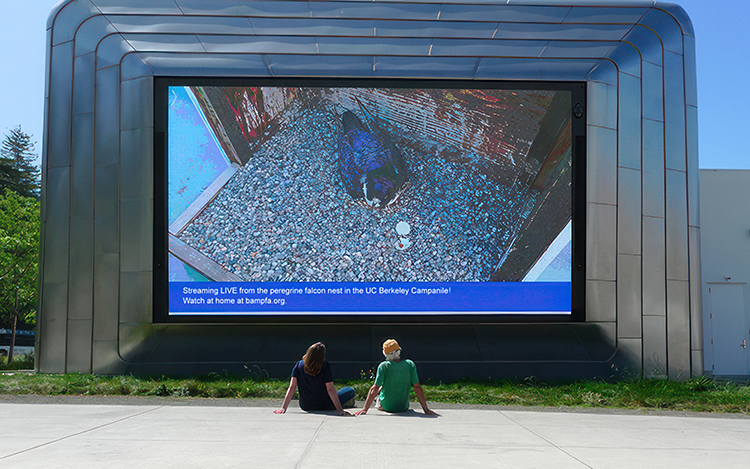
The public is invited to watch the hatching of Annie and Lou’s eggs on Tuesday, April 11, on the big screen outside the Berkeley Art Museum and Pacific Film Archive. (Photo by BAMPFA)
Peterson said the first egg likely will hatch “either very late April 10 or early on the morning of April 11. Typically, all the eggs hatch within about 48 hours. The first three eggs are usually closest together, followed by the fourth.”
Not all the eggs that Annie has laid annually since she arrived on campus in late 2016 have hatched. She usually produces four eggs a year, and typically one fails to open, said Peterson.
“It’s a little strange that she’s never had all her eggs hatch before,” he added. “It could just be random chance, or it could be some characteristic unique to Annie. It’s really hard to say.”
But he added that Annie and Lou, who’s been Annie’s mate since last November, “have been caring for all the eggs the same way, so fingers crossed we’ll have all four hatch.” Annie lost longtime mate Grinnell in March 2022, and then a second mate, Alden, last fall.
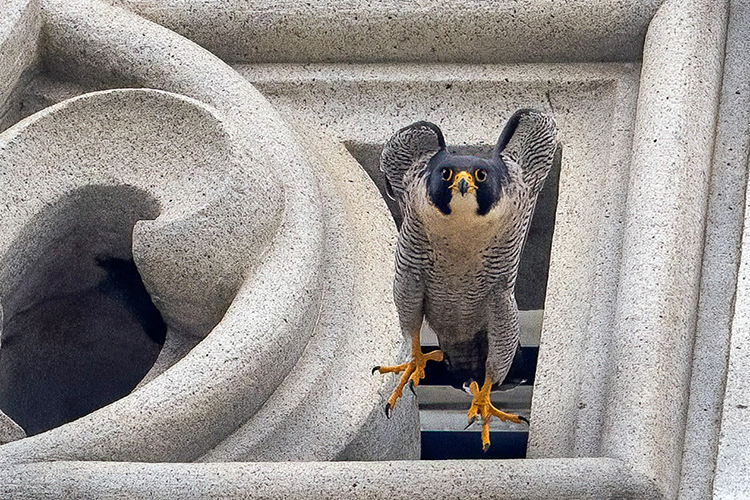
This will be Lou’s first time as a father. He arrived in Annie’s life last November after she’d lost prior mates Grinnell and Alden. (Photo by Bridget Ahern)
The April 11 BAMPFA-Cal Falcons event is the second one to take place at the outdoor screen on Addison Street. The first time was in 2019, when a whopping 700 spectators showed up. But the following year, the pandemic hit.
“We were thrilled when Cal Falcons first approached us in 2019 to livestream that year’s hatching, which was incredibly popular with our audiences and a great use of our magnificent outdoor screen,” said BAMPFA spokesperson A.J. Fox. “COVID put a crimp in our plans after that, but we’re delighted to reprise the partnership this year.”
Last year, a Hatch Day event was held on campus near the Valley Life Sciences Building, but without a livestreamed option for attendees to watch the hatching together. Still, “hundreds of people came and went,” said Mary Malec, a Cal Falcons raptor expert.
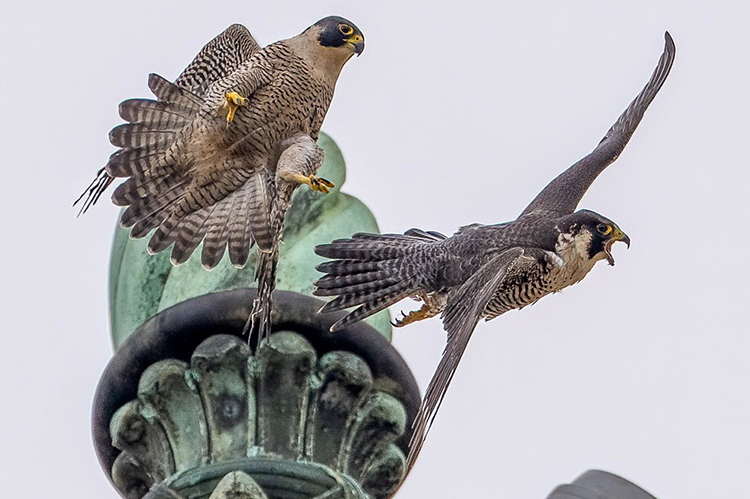
While Annie (left) primarily is incubating the eggs right now, she fought off another falcon earlier this spring that was seeking to take over her territory. (Photo by Bridget Ahern)
This year, Malec and other members of Cal Falcons, wearing Cal Falcons T-shirts, will staff an information table outside the BAMPFA and hand out stickers and other freebies. Malec added that the Berkeley Public Library will provide “games and books and things to color” from 11 a.m. to 3 p.m.
Cal Falcons provides the library with a few sets of binoculars a year that can be loaned, along with bird identification books, to people who want to search for and learn more about birds in the Bay Area, she said.
After the eggs hatch, Peterson said the chicks will depend on Annie and Lou to incubate them for about 10 days, so they can stay warm.
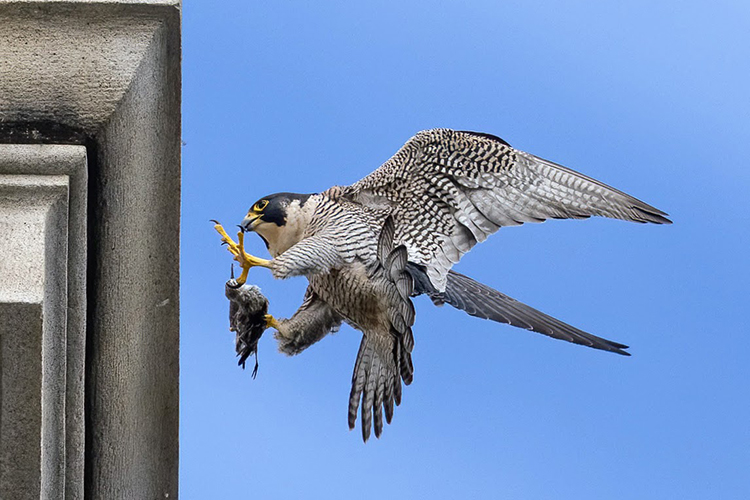
Lou has been busy catching prey, providing meals for Annie and, soon, for the chicks, too. (Photo by Bridget Ahern)
“Lou will still be the primary hunter,” said Peterson. “Annie won’t likely start to hunt for around three weeks or so. With past partners, she has performed the lion’s share of feeding the chicks, so we’ll see if that trend holds up again.”
The chicks’ first meal typically happens within 12 hours of hatching, and they’re fed a strict diet of meat. Annie will “very carefully pick small portions of meat off of prey to give to the chicks,” said Peterson.
The most likely timing for the chicks to begin flying off the Campanile is around May 21, he said, adding that “all the chicks likely will have flown by May 28,” with the males frequently fledging a few days before the females.